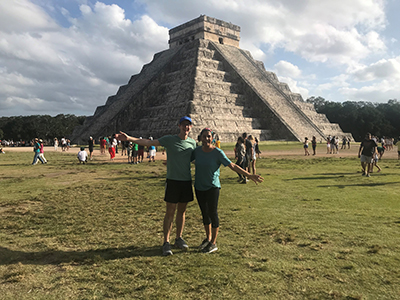

International Service Learning and its Implications for Healthcare Practice
Related Objective(s)
"To be culturally humble means that I am willing to learn," - Joe Gallagher
One of the twelve Maternal and Child Health (MCH) Leadership Competencies includes cultural competency. As stated in the handbook, cultural competence is "a developmental process that occurs along a continuum and evolves over an extended period" (Maternal Health & Child Bureau, 2018). What better way to engage in this developmental process than to participate in international service learning?
The Leadership Education in Neurodevelopmental and Related Disabilities (LEND) Program at Oregon Health & Science University (OHSU) recently supported a ten-day international service learning trip to Merida, Mexico. Current physical therapy LEND trainee (David Down DPT, PT), two other faculty members (Bethany Sloane DPT, PT, Erin Cochran MA, OTR/L), and myself (Janvi Patel OTD, OTR/L) worked alongside Wheeling University's physical therapy faculty and the program's current second year physical therapy students in various community health centers, schools, and group homes servicing individuals with disabilities. We were fortunate to have Bethany Sloane, a Wheeling University and OHSU LEND trainee alumnus, support this trip for the last eight years and share the experience.
Each day was filled with cultural immersion, professional collaboration with therapists and educators, as well as, personal reflection. Whether I was learning to order food in Spanish at a local restaurant, or providing treatment suggestions to therapy providers at a school for children with disabilities, I was constantly pushed outside of my comfort zone. However, I relished in this feeling of "being out of place". For once, I was experiencing a small sliver of what I know many of my clients of different cultural backgrounds might be feeling when living and receiving care in the United States. I am grateful that this trip furthered me along in my personal cultural competency journey.
I learned that cultural competency is the ability to reflectively listen. This meant allowing therapy providers to discuss their understanding of a child's condition, outline their clinical reasoning, and justify their clinical opportunities without trying to interject
I learned that cultural competency is providing authentic validation. This meant acknowledging therapy providers efforts to do good by their clients, mirroring their pride when they present their creative, homemade therapy materials to you, and reminding them that we too face challenges with interdisciplinary care.
I learned that cultural competency is unwavering respect. This meant not imposing personal ideals of play, disability, or occupation. Rather, it mean to express to locals that different is never bad, but just that- different. Different is more than okay, because different is how everyone learns.
However, maybe my biggest lesson was realizing that one can never truly be "culturally competent". Rather, we should strive for culturally responsive. We need to recognize that we can never truly understand the ins and outs of every culture. Instead, we need to hone our abilities to reflectively listen, and provide authentic validation with unwavering respect. To be culturally responsive is to engage in the "developmental process" that MCH writes about.
My lessons in culture from this trip have warmed my heart, and left me with a lifetime of reflections. However, you do not need to travel far in order to be humbled by the culture that exists around us every day. I hope you can find those opportunities in your home, and engage in your own cultural responsiveness journeys!

Image of two LEND trainees in Mexico